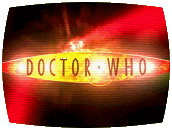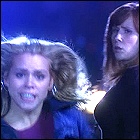 During a visit to a futuristic Chinatown, Donna is lured into a fortune teller’s booth, where her fortunes aren’t so much predicted as changed drastically. She finds herself over a year in the past, at the moment when she decided to take a job her mother found for her instead of going to work as a temp at H.C. Clemens – where she was working when her path became inextricably linked with the Doctor’s. History changes. Without Donna to convince him to show the Empress of the Racnoss some mercy, the Doctor’s mission to stop the Empress becomes a suicide mission. UNIT finds the Doctor’s body, having suffered too much damage to regenerate – the last of the Time Lords has died. Without the Doctor, history unfolds very differently, but few notice the divergence until the moment when the starship Titanic slams into Buckingham Palace and its reactor goes critical on impact, destroying London totally. Donna and her family are assigned to a home in Leeds in a besieged and increasingly xenophobic Britain, a world that they would never have chosen to live in. Further events that would have been stopped by the Doctor continue to drastically alter the world: America is laid to waste by the Adipose incident, while the Atmos devices choke millions across the globe. And with each disaster, a young woman named Rose appears to Donna, insisting that she is the most important woman in human history – Donna must go with Rose to fulfill her destiny and set history back on its rightful course. But why should Donna Noble believe a total stranger who claims to be from another dimension of reality?
During a visit to a futuristic Chinatown, Donna is lured into a fortune teller’s booth, where her fortunes aren’t so much predicted as changed drastically. She finds herself over a year in the past, at the moment when she decided to take a job her mother found for her instead of going to work as a temp at H.C. Clemens – where she was working when her path became inextricably linked with the Doctor’s. History changes. Without Donna to convince him to show the Empress of the Racnoss some mercy, the Doctor’s mission to stop the Empress becomes a suicide mission. UNIT finds the Doctor’s body, having suffered too much damage to regenerate – the last of the Time Lords has died. Without the Doctor, history unfolds very differently, but few notice the divergence until the moment when the starship Titanic slams into Buckingham Palace and its reactor goes critical on impact, destroying London totally. Donna and her family are assigned to a home in Leeds in a besieged and increasingly xenophobic Britain, a world that they would never have chosen to live in. Further events that would have been stopped by the Doctor continue to drastically alter the world: America is laid to waste by the Adipose incident, while the Atmos devices choke millions across the globe. And with each disaster, a young woman named Rose appears to Donna, insisting that she is the most important woman in human history – Donna must go with Rose to fulfill her destiny and set history back on its rightful course. But why should Donna Noble believe a total stranger who claims to be from another dimension of reality?
written by Russell T. Davies
directed by Graeme Harper
music by Murray GoldCast: David Tennant (The Doctor), Catherine Tate (Donna Noble), Billie Piper (Rose Tyler), Bernard Cribbins (Wilfred Mott), Jacqueline King (Sylvia Noble), Joseph Long (Rocco Colasanto), Noma Dumezweni (Capt. Magambo), Chipo Chung (Fortune Teller), Marcia Lecky (Mooky Kahari), Suzann McLean (Veena Brady), Natalie Walter (Alice Coltrane), Neil Clench (Man in pub), Clive Standen (UNIT Soldier), Bhasker Patel (Jival Chowdry), Catherine York (Female Reporter), Ben Righton (Morgenstern), Loraine Velez (Spanish Maid), Jason Mohammad (Studio News Reader), Sanchia McCormack (Housing Officer), Lawrence Stevenson (Soldier #1), Terri-Ann Brumby (Woman in doorway), Lachele Carl (Trinity Wells), Paul Richard Biggin (Soldier #2)
Appearing in footage from The Runaway Bride: Sarah Parish (Empress)
Notes: The Trickster is mentioned as being the architect of the beetle-like creature on Donna’s back; though he isn’t actually seen in this episode, the Trickster did feature prominently in the Sarah Jane Adventures story Whatever Happened To Sarah Jane?, in which he threatened to remove the Doctor from time; presumably Turn Left is where he tried to make good on that threat. Sarah Jane and her three young friends from that spinoff series, Luke, Maria and Clyde, are said to have been in the same hospital where Martha Jones worked (and died), and in the absence of the Doctor, Sarah is said to have prevented the Earth from being blasted by an accelerated MRI machine (as seen in Smith And Jones), paying for that bravery with her life and the lives of her young friends. Similarly, Captain Jack, Gwen and Ianto of Torchwood apparently prevent the Sontaran takeover of Earth (The Poison Sky) at the cost of their own lives. Chipo Chung guest starred in the 11th episode of season three as well, as Chantho, while Lachele Carl’s American news anchor – after appearing in episodes since the first season and even appearing in the same role in the Sarah Jane Adventures – finally picks up a name.
LogBook entry & review by Earl Green
Review: A second straight winner from the pen of Russell T. Davies, Turn Left brings the fourth season of the new Doctor Who down the home stretch, playing out initially as “It’s Not Really Such A Wonderful Life.” But more than simply demonstrating the effects on Earth of not having the Doctor around to save the human race time and again, Turn Left packs a gut-punch of a surprise: if you thought all of season one‘s themes were wrapped up and tied off, such as Bad Wolf, you’re so wrong.
In a way, this is also Davies coming down the home stretch of his era as the showrunner of Doctor Who. Though he’ll be sticking around to write and produce the various one-off specials during the 2009 “gap year,” Davies seems to be hinting at a grand summation of the his revitalized Who and its crop of spinoffs. Torchwood and The Sarah Jane Adventures are explicitly referenced here, almost surprisingly so – and the story does not slow down to hold your hand and explain itself slowly if you haven’t kept up with the whole franchise.
 At first glance, this spinoff-mania may seem to be strictly a background texture, with Rose mentioning Torchwood’s suicide misson and a television news announcer mentioning the death of Sarah Jane and the kids from her series, but it’s not all in the background. The mention of the Trickster character all but makes the SJA two-parter Whatever Happened To Sarah Jane? required viewing, and it raises the interesting possibility that Turn Left occurs, in its entirety, during a brief interval of Whatever Happened. Perhaps knowing that the entire Doctor Who universe has a rabid following that watches/reads/listens to every permutation emboldened Davies enough to take this uncompromisingly interlocked approach here; in any case, this is the kind of intricately interwoven universe that many SF fans, myself included, were disappointed that we didn’t see with the simultaneous Star Trek series of the 1990s.
At first glance, this spinoff-mania may seem to be strictly a background texture, with Rose mentioning Torchwood’s suicide misson and a television news announcer mentioning the death of Sarah Jane and the kids from her series, but it’s not all in the background. The mention of the Trickster character all but makes the SJA two-parter Whatever Happened To Sarah Jane? required viewing, and it raises the interesting possibility that Turn Left occurs, in its entirety, during a brief interval of Whatever Happened. Perhaps knowing that the entire Doctor Who universe has a rabid following that watches/reads/listens to every permutation emboldened Davies enough to take this uncompromisingly interlocked approach here; in any case, this is the kind of intricately interwoven universe that many SF fans, myself included, were disappointed that we didn’t see with the simultaneous Star Trek series of the 1990s.
It’s also interesting to note that the Doctor isn’t really done away with by malicious means in the alternate timeline. No one comes up and shoots or stabs him and takes him out of the picture. With the manipulation of the timeline simply involving depriving the Doctor of a companion at a key moment, the Doctor’s own nature – and his darker nature at that – seals his doom. Only a minor tweak was required. This goes some way toward validating Donna, who I’m not sure everyone has enjoyed as much as I have – indeed, since she is a known quantity and a celebrity in her own right, I’ve noticed that there seems to be more of a reluctance to accept her in a dramatic role on Doctor Who among certain parts of the British audience than there is among those who simply haven’t been exposed to the Catherine Tate Show; I’m not sure if it’s on the level against the hardcore fans’ backlash against Bonnie Langford in 1986, but while I was already liking the character of Donna this season, this episode in particular ought to put to rest anyone’s doubts that Tate can handle a dramatic role.
And it’s got to be that way, because there really isn’t a lot of humor here – this is quite possibly as dark as Doctor Who has gotten in the new series. As if killing Sarah Jane Smith and her juvenile sidekicks isn’t dark enough, we here see a kind of “it couldn’t happen here” Britain, complete with non-natives being shipped off to euphemistically labeled “labor camps”, mass relocations, and martial law. Donna’s grandfather Wilf, given a dramatic and non-comic reading by Bernard Cribbins at his best here, serves as the story’s barometer for civilization going to hell in a handbasket: he sees Britain doing things that Britain’s enemies did during World War II, and he challenges a particularly paranoid soldier who trains his gun on Donna. Like Catherine Tate, even though much of Bernard Cribbins’ career is associated with comedy, he’s got the dramatic chops for this story – and it helps that Davies has imbued his script with a sociopolitical message much more resonant and meaningful than, oh, say, Harriet Jones taking easy cheap shots at American foreign policy.
The final minute or so of the story, however, pulls the rug out from under everything, setting the stage for an even darker story.

